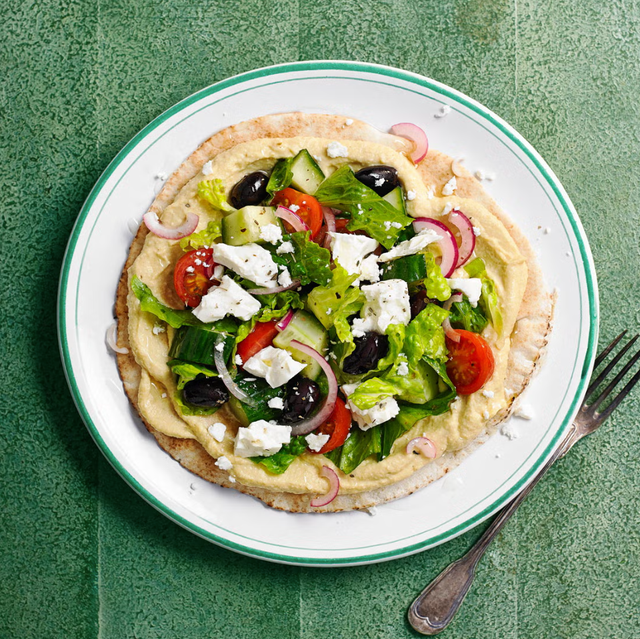The best Mediterranean diet and recipe ideas for beginners
Eating healthier couldn't be easier with this helpful guide.

Sitting at a taverna enjoying a delicious Greek salad full of the freshest veggies, and a delectable grilled fish as you stare into the Aegean Sea sounds totally dreamy — but even if you can't spring for airfare to Santorini right now, you can enjoy the health benefits of the Mediterranean-style diet, which is as good for your heart and brain as it is for your taste buds.
Years of research show that consuming a Mediterranean-style diet filled with fresh fruits, vegetables, nuts, whole grains, seafood and heart-healthy fats can help reduce the risk of strokes and total cardiovascular disease, including heart disease. It may also help in the prevention of type 2 diabetes.
What is the Mediterranean diet?
Not as much a "diet" as a way of life (read: no calorie-counting!), the Mediterranean diet originated from the people who live in the countries surrounding the Mediterranean Sea, including Greece, Italy and Spain. It's inspired by their dining habits and lifestyle. While there are certainly guidelines, there are no real rules or restrictions; instead Mediterranean diet recipes put an emphasis on enjoying healthy fats and plant-forward dishes with a moderate amount of dairy and minimal amounts of red meat, processed foods and added sugar.
This balanced and sustainable way of eating does not require you to meticulously track carbs or eliminate any of your favourite foods or beverages (moderate amounts of red wine included!). In addition to encouraging healthy eating, the Mediterranean diet also emphasises incorporating daily physical activity into your routine.
Mediterranean diet health benefits
One of the key benefits of the Mediterranean diet is that it is anti-inflammatory and can help maintain healthy cholesterol and blood pressure levels, as well as support good gut bacteria. In 2013, a team of researchers at the University of Barcelona who studied more than 7,000 participants documented drastic improvements in their heart health. A more recent study also found that elderly people may vastly improve brain function and their own longevity by adopting the Mediterranean diet.
Some of the science-backed health benefits of the Mediterranean lifestyle include:
- Reduced risk of heart disease. You'll eat plenty of fatty fish (including salmon!), which is rich with heart-healthy omega-3 fatty acids, on this plan, while cutting down on red meat, which is higher in saturated fat. Studies show consuming fish at least twice a week can decrease the risk of heart disease and stroke. Additionally, low-sodium diets, such as the Mediterranean diet, can help to prevent and/or control high blood pressure.
- Reduced risk of stroke. The Mediterranean diet may help to reduce bad (LDL) cholesterol, which is associated with an increased risk of a stroke. The diet encourages healthy fats, such as olive oil, which is rich in monounsaturated fat and associated with lowering bad cholesterol (LDL), while limiting saturated fats, such as butter and margarine, which may raise LDL.
- Decreased risk of type 2 diabetes. Research shows that following the Mediterranean diet can be helpful in preventing and managing type 2 diabetes. That's because it may improve insulin sensitivity and overall gut bacteria, thanks to its emphasis on high-fiber and anti-inflammatory foods and fewer added sugars and refined grains.
- Cognitive decline prevention. If your goal is to keep your brain sharper and healthier as you age, this diet can help: It emphasises plant-based foods that are naturally rich in vitamins, minerals, antioxidants and fibre, such as vegetables, grains, nuts, seeds, legumes and fruits. According to some studies, following this type of diet may slow the progression of Alzheimer's disease and can help to reduce the risk of dementia.
- Weight management. While the main goal of this eating plan is to stay healthy, it can help you slim down or maintain a steady weight. A recent study found that following the Mediterranean diet may lead to a reduced risk of obesity and may help prevent weight gain and reduce the risk of increased weight circumference.
- Reduced risk of overall mortality. Best of all, you may live longer! Studies show that overall mortality risk is decreased when the Mediterranean diet is combined with physical activity.
Mediterranean diet top food list
There are no magic ingredients or trendy superfood ideas here: As is the case with almost every legitimate healthy diet, this one emphasises whole grains, fresh produce, lean protein and heart-healthy unsaturated fats. Add to that plenty of fatty fish (especially salmon recipes) and generous servings of legumes, nuts and seeds, and you have an easy-to-follow way to plan three filling meals a day. Don't know where to begin? Here is a list of foods to consider eating on the Mediterranean diet:
Eat mostly
- Vegetables: artichokes, arugula, avocado, beets, bell peppers, broccoli, cabbage, carrots, celery, cauliflower, cucumbers, eggplant, kale, leafy greens, spinach, tomatoes, potatoes, sweet potato, turnips, zucchini
- Fruits: apples, apricots, cherries, clementines, dates, figs, grapefruit, melons, nectarines, oranges, peaches, pears, pomegranates, strawberries, tangerines
- Legumes, nuts and grains: almonds, barley, buckwheat, bulgur wheat, cannellini beans, chickpeas, couscous, farro, fava beans, kidney beans, lentils, navy beans, oats, orzo, pine nuts, pistachios, quinoa, walnuts
- Healthy fats and vinegars: apple cider vinegar, balsamic vinegar, extra virgin olive oil, red wine vinegar
- Herbs and spices: allspice, basil, bay leaves, cinnamon, cloves, coriander, crushed red pepper flakes, cumin, dill weed, garlic powder, mint, nutmeg, onion powder, oregano, parsley, rosemary, sage, smoked paprika, sumac, thyme, turmeric, za’atar
- Other essentials: olives, sesame seeds, tahini
Eat in moderation
- Dairy and cheese: feta, goat and sheep cheeses, Manchego, Parmigiano Reggiano, ricotta, yogurt, eggs
- Seafood and meat: chicken, fish, shellfish, red meat (lean cuts)
Drink
- Stay hydrated by sipping on calorie-free beverages like water, seltzer, unsweetened tea and black coffee.
- Enjoy an occasional glass of dry red or white wine.
Foods to limit on the Mediterranean Diet
Nothing is strictly off-limits on this plan, but there are certain foods that are higher in saturated fat, simple carbs, and sugar that you'll want to put on the “once in a while” list rather than every day. These include:
• Red meat
• Processed meat (sausage, cold cuts, bacon)
• Processed foods (shelf-stable biscuits, crisps, ready meals, any kind of "nugget")
• Sugary beverages and sweets
• Refined grains (white rice, white bread, pasta, crackers)
• Butter (use olive oil instead)
• Alcohol other than red or white wine
Snacks to eat on the Mediterranean Diet
If you like to munch during the day, no worries: There are plenty of tasty snacks on this plan that include fibre and healthy fats to satisfy your mid-afternoon munchies:
• Hummus with baby carrots or cucumbers
• Salsa
• Crispy chickpeas
• A handful of raspberries or blueberries
• Pistachios
• Frozen grapes
• Avocado on whole-grain crackers
What to order when you eat out
Because the Mediterranean diet doesn't have a super-strict set of guidelines, you can have some flexibility so you don't have to stress going to a restaurant. It's easy to stay focused on this eating plan even when you go out with friends for dinner or hit the diner for brunch. Some smart ordering strategies:
• Order the seafood: Most every type of cuisine will have fish, shrimp, or scallops on the menu. Ask for it grilled, not fried.
• Pile on the veggie sides, and go for grains such as quinoa or brown rice.
• Order a Greek salad or eggs cooked with tomatoes, peppers, spinach and other veggies.
• Skip the bread basket, or ask for whole grain bread and dip in olive oil instead of slathering on the butter.
Mediterranean diet recipe ideas
Editor's note: Weight loss, health and body image are complex subjects. While the Mediterranean diet enjoys a rare level of widespread support from dietary experts, it's always best to consult with your healthcare provider before starting any new eating plan.


Stop chasing orgasms: 5 steps to satisfying sex

Jess Phillips on new funding for abuse victims

Chronic stress is bad for you - here's what to do

Alzheimer’s runs in my family. What can I do?















